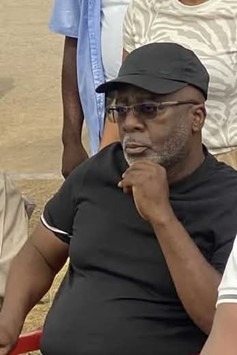In the wake of a devastating fire at Liberia’s Capitol Building, Speaker Fonati Koffa has found himself embroiled in controversy surrounding a Facebook post that appeared on his timeline. The post, which contained the word “Alamo,” sparked public suspicion and accusations regarding Koffa’s potential involvement in the arson attack. Koffa has vehemently denied authorship of the post, distancing himself from its content and emphasizing that the term “Alamo” refers to the defense of one’s rights, not an act of arson. He has called for a swift and thorough investigation to determine the true perpetrators of the fire and bring them to justice.
Koffa’s clarification of the term “Alamo,” referencing the 1836 battle in Texas where a small group of Texans fought for independence against Mexican forces, has done little to quell the public outcry. While he maintains that the word signifies the defense of rights and has no connection to fire or violence, the timing of the post and its appearance on his timeline have fueled speculation and suspicion. His subsequent deletion of the post has only served to further intensify public scrutiny. The incident has underscored the power of social media in shaping public perception and the potential consequences of online activity, particularly for public figures.
Adding to the controversy, Liberian lawyer Cllr. Moriah Yeakula Korkpor, while stopping short of directly accusing Koffa of involvement, criticized the post as “ill-advised,” questioning its timing and appropriateness given the circumstances. Korkpor’s comments reflect a broader concern within the Liberian legal community about the potential implications of such statements, especially during an ongoing investigation. She has urged caution against inflammatory accusations and speculative statements that could hinder the investigative process. Her call for a speedy and impartial investigation echoes Koffa’s own demands for justice and accountability.
The incident has exposed existing tensions within the Liberian House of Representatives, where Koffa has faced ongoing challenges to his leadership. The fire at the Capitol Building has exacerbated these tensions, creating a climate of suspicion and mistrust. While the Unity Party has seemingly pointed fingers at Koffa without concrete evidence, Korkpor has cautioned against premature accusations, emphasizing the importance of due process and a thorough investigation before assigning blame. The situation highlights the delicate balance between freedom of speech and the responsible use of social media platforms, especially for individuals in positions of power.
The controversy surrounding Koffa illustrates the rapid spread of information and misinformation in the digital age. The Facebook post, regardless of its origin or intent, quickly became a focal point of public discussion and speculation. The incident underscores the need for critical thinking and media literacy in evaluating online information, particularly during times of crisis or political tension. The public’s immediate reaction to the post demonstrates the speed with which online narratives can take hold and influence public opinion.
The fire at the Capitol Building and the subsequent controversy surrounding Speaker Koffa’s Facebook post have brought several underlying issues to the forefront of Liberian public discourse. The incident highlights the importance of transparency and accountability within the government, the responsible use of social media, and the need for a thorough and impartial investigation to determine the facts of the case. The situation also emphasizes the delicate balance between freedom of speech and the potential for online platforms to be used to spread misinformation or incite violence. As the investigation unfolds, the public will be closely watching to see how the government addresses these complex issues and ensures justice is served.














